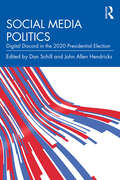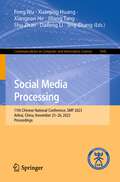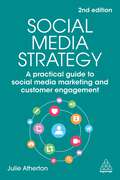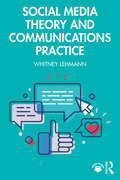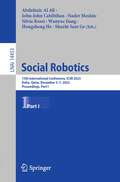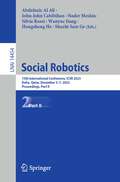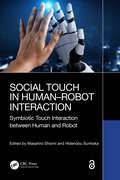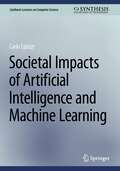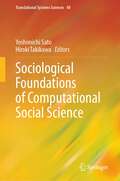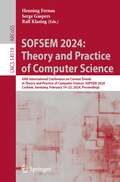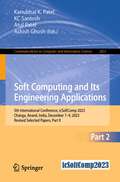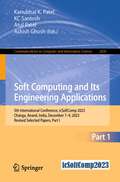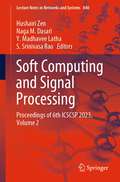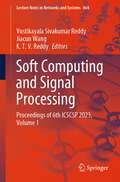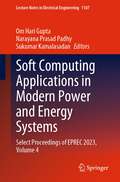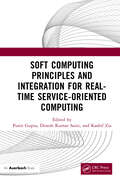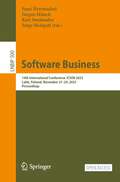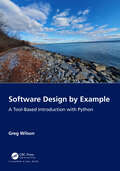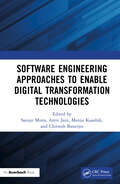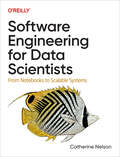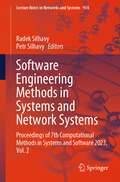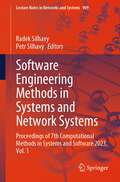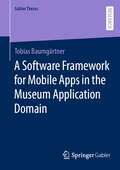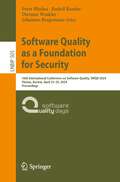- Table View
- List View
Social Media Politics: Digital Discord in the 2020 Presidential Election
by Dan Schill John Allen HendricksSocial media and social networking services are integrated into the American political process and have profoundly influenced political communication and participation. Social media platforms have transformed the political landscape by revolutionizing information dissemination, citizen engagement, and public opinion formation and change. Politicians use social media to communicate directly with voters in an unmediated and unfiltered manner. Comparatively, voters use social media to follow the latest messaging from politicians accompanied by demonstrating their support for particular politicians. This book is a comprehensive examination of the role of digital and social media in the 2020 U.S. presidential election. Political discourse during the 2020 election revealed political disharmony and a deep political division among vast swaths of Americans that was powered, in part, by social media. This book reveals how digital and social media have reshaped power dynamics by altering the relationships among citizens, politicians, and traditional media outlets, the emergence of new influencers, and the impact of online activism on policy agendas.This book, Social Media Politics, includes scholars with varied backgrounds and experience, using both quantitative and qualitative methodologies, from leading research institutions around the nation. Students, scholars, and practitioners will gain new knowledge to more clearly understand the role social media played in the 2020 presidential campaign.
Social Media Processing: 11th Chinese National Conference, SMP 2023, Anhui, China, November 23–26, 2023, Proceedings (Communications in Computer and Information Science #1945)
by Feng Wu Xuanjing Huang Xiangnan He Jiliang Tang Shu Zhao Daifeng Li Jing ZhangThis book constitutes the thoroughly refereed proceedings of the 11th Chinese National Conference of Social Media Processing, SMP 2023, held in Anhui, China, in November 2023.The 16 full papers presented were carefully reviewed and selected from 88 submissions. The papers are organized in the topical sections on knowledge representation and reasoning; knowledge acquisition and knowledge base construction; linked data, knowledge integration, and knowledge graph storage management; natural language understanding and semantic computing; knowledge graph applications; knowledge graph open resources.
Social Media Strategy: A Practical Guide to Social Media Marketing and Customer Engagement
by Julie AthertonSocial media marketing is no longer optional. This book unpacks the winning formula for effective social media marketing complete with comprehensive updates and latest developments.Integrated marketing and PR strategies are a requirement for all businesses but with the explosion of social media and content marketing many organizations still struggle to know which channels to invest in and how to maximize their impact. Social Media Strategy gives clear guidance with a simple structured approach to executing campaigns that work. It provides a blueprint for planning, delivering and measuring social media's contribution to your business through:- Identifying and targeting audience segments - Maximizing social search - Enhanced reputation management - Managing a diversified influencer portfolio - Selecting the right channels for organic and paid social - Creating a process and structure to improve efficiencies- Using appropriate technology including AIWith explanations of best-practice tools and practical downloadable templates, this new edition includes new and updated interviews and case studies from industry leaders, influencers and brands including TUI, Greggs, Lego, Ryan Air, National Geographic and others. Social Media Strategy delivers a long-term solution for maximizing social media-led business development.
Social Media Theory and Communications Practice
by Whitney LehmannFusing the academic with the applied, this book provides a comprehensive introduction to social media for future communications professionals. While most social media texts approach the subject through either a theoretical, scholarly lens or a professional, practical lens, this text offers a much-needed linkage of theory to the practical tactics employed by social media communicators. Concise and conversational chapters break down the basics of both social media theory and practice and are complemented by sidebars written by scholars and industry professionals, chapter summaries and end-of-chapter exercises. This book is ideal for introductory social media courses in communication, public relations and mass communication departments, as well as courses in digital media and public relations. Online resources include social media writing templates, sample posts and content calendar templates. Please visit www.routledge.com/9781032185873.
Social Media Theory and Communications Practice
by Whitney LehmannFusing the academic with the applied, this book provides a comprehensive introduction to social media for future communications professionals.While most social media texts approach the subject through either a theoretical, scholarly lens or a professional, practical lens, this text offers a much-needed linkage of theory to the practical tactics employed by social media communicators. Concise and conversational chapters break down the basics of both social media theory and practice and are complemented by sidebars written by scholars and industry professionals, chapter summaries and end-of-chapter exercises.This book is ideal for introductory social media courses in communication, public relations and mass communication departments, as well as courses in digital media and public relations.Online resources include social media writing templates, sample posts and content calendar templates. Please visit www.routledge.com/9781032185873.
Social Robotics: 15th International Conference, ICSR 2023, Doha, Qatar, December 3–7, 2023, Proceedings, Part I (Lecture Notes in Computer Science #14453)
by Abdulaziz Al Ali John-John Cabibihan Nader Meskin Silvia Rossi Wanyue Jiang Hongsheng He Shuzhi Sam GeThe two-volume set LNAI 14453 and 14454 constitutes the refereed post-conference proceedings of the 15th International Conference on Social Robotics, ICSR 2023, held in Doha, Qatar, during December 4–7, 2023. The 68 revised full papers presented in these proceedings were carefully reviewed and selected from 83 submissions. They deal with topics around the interaction between humans and intelligent robots and on the integration of robots into the fabric of society. This year the special topic is "Human-Robot Collaboration: Sea; Air; Land; Space and Cyberspace”, focusing on all physical and cyber-physical domains where humans and robots collaborate.
Social Robotics: 15th International Conference, ICSR 2023, Doha, Qatar, December 3–7, 2023, Proceedings, Part II (Lecture Notes in Computer Science #14454)
by Abdulaziz Al Ali John-John Cabibihan Nader Meskin Silvia Rossi Wanyue Jiang Hongsheng He Shuzhi Sam GeThe two-volume set LNAI 14453 and 14454 constitutes the refereed post-conference proceedings of the 15th International Conference on Social Robotics, ICSR 2023, held in Doha, Qatar, during December 4–7, 2023. The 68 revised full papers presented in these proceedings were carefully reviewed and selected from 83 submissions. They deal with topics around the interaction between humans and intelligent robots and on the integration of robots into the fabric of society. This year the special topic is "Human-Robot Collaboration: Sea; Air; Land; Space and Cyberspace”, focusing on all physical and cyber-physical domains where humans and robots collaborate.
Social Touch in Human–Robot Interaction: Symbiotic touch interaction between human and robot
by Masahiro Shiomi Hidenobu SumiokaIn this book for researchers and students, editors Shiomi and Sumioka bring together contributions from researchers working on the CREST project at ATR Deep Interaction Laboratories, a world leader in social robotics, to comprehensively describe robot touch systems from hardware to applications.Appropriate touch from robots to humans is essential for social robots, but achieving this requires various solutions at every stage of the touch process. Through this book, readers will gain an understanding of the needs, essential systems and communication cues, behaviour designs, and real‑world issues for social touch applications. This book compiles and updates technical and empirical research that was previously scattered throughout the literature into a single volume. Through individually authored chapters addressing various elements of ATR’s CREST project, this book tackles key areas where understanding is needed to realize acceptable touch interaction, including pre‑touch interaction, interaction design for touching and being touched, behaviour changes caused by touch interaction, and applications of social touch interaction. It introduces a touch sensor and robots developed by the authors, including several touch‑related behaviours and design policies. This approach will enable readers to easily apply this knowledge to their own social robotics programs. This book is invaluable for anyone who wishes to understand and develop social robots that physically interact with people.It is most beneficial for researchers and upper undergraduate and graduate students in the fields of human–robot/agent/computer interaction and social touch interaction and those in the broader fields of engineering, computer science, and cognitive science.
Societal Impacts of Artificial Intelligence and Machine Learning (Synthesis Lectures on Computer Science)
by Carlo LipizziThis book goes beyond the current hype of expectations generated by the news on artificial intelligence and machine learning by analyzing realistic expectations for society, its limitations, and possible future scenarios for the use of this technology in our current society. Artificial Intelligence is one of the top topics today and is inflating expectations beyond what the technology can do in the foreseeable future. The future cannot be predicted, but the future of some elements of our society, such as technology, can be estimated. This book merges the modeling of human reasoning with the power of AI technology allowing readers to make more informed decisions about their personal or financial decisions or just being more educated on current technologies. This book presents a model that sketches potential future scenarios based on a discussion of the expectations today, the analysis of the current gap in the literature, and a view of possible futures in terms of technology and use cases. Specifically, this book merges literature on the technology aspects, the sociological impacts, and philosophical aspects.
Sociological Foundations of Computational Social Science (Translational Systems Sciences #40)
by Yoshimichi Sato Hiroki TakikawaThis book provides solid sociological foundations to computational social science (CSS). CSS is an emerging research field, and many books with those words in the title are on the market. However, CSS has not become mainstream in sociology, for which there are two reasons. First, CSS does not necessarily solve major research questions in sociology. Second, its sociological foundations are weak. These two reasons are interrelated—that is, CSS cannot solve major research questions because its sociological foundations are weak. Thus, even if it tries to solve those questions, its approaches seem to mainstream sociologists to miss the point. To resolve that shortcoming, this book fills the gap between CSS and sociology, shows that CSS can solve major research questions in sociology, and advances sociology by introducing to it theories and methodologies of CSS.
SOFSEM 2024: 49th International Conference on Current Trends in Theory and Practice of Computer Science, SOFSEM 2024, Cochem, Germany, February 19–23, 2024, Proceedings (Lecture Notes in Computer Science #14519)
by Henning Fernau Serge Gaspers Ralf KlasingThis book constitutes the proceedings of the 49th International Conference on Current Trends in Theory and Practice of Computer Science, SOFSEM 2024, held in Cochem, Germany, in February 2024. The 33 full papers presented in this book were carefully reviewed and selected from 81 submissions. The book also contains one invited talk in full paper length. They focus on original research and challenges in foundations of computer science including algorithms, AI-based methods, computational complexity, and formal models.
Soft Computing and Its Engineering Applications: 5th International Conference, icSoftComp 2023, Changa, Anand, India, December 7–9, 2023, Revised Selected Papers, Part II (Communications in Computer and Information Science #2031)
by Kanubhai K. Patel Kc Santosh Atul Patel Ashish GhoshThe two-volume proceedings constitutes the refereed proceedings of the 5th International Conference on Soft Computing and its Engineering Applications, icSoftComp 2023, held in Changa, Anand, India, in December 2023. The 42 full papers and 2 short papers included in this book were carefully reviewed and selected from 351 submissions. They are organized in topical sections as follows: Volume number 2020: Theory and Methods; Systems and ApplicationsVolume number 2031: Systems and Applications; Hybrid Techniques.
Soft Computing and Its Engineering Applications: 5th International Conference, icSoftComp 2023, Changa, Anand, India, December 7–9, 2023, Revised Selected Papers, Part I (Communications in Computer and Information Science #2030)
by Kanubhai K. Patel Kc Santosh Atul Patel Ashish GhoshThe two-volume proceedings constitutes the refereed proceedings of the 5th International Conference on Soft Computing and its Engineering Applications, icSoftComp 2023, held in Changa, Anand, India, in December 2023. The 42 full papers and 2 short papers included in this book were carefully reviewed and selected from 351 submissions. They are organized in topical sections as follows: Volume number 2020: Theory and Methods; Systems and ApplicationsVolume number 2031: Systems and Applications; Hybrid Techniques.
Soft Computing and Signal Processing: Proceedings of 6th ICSCSP 2023, Volume 2 (Lecture Notes in Networks and Systems #840)
by Hushairi Zen Naga M. Dasari Y. Madhavee Latha S. Srinivasa RaoThis book presents selected research papers on current developments in the fields of soft computing and signal processing from the Sixth International Conference on Soft Computing and Signal Processing (ICSCSP 2023). The book covers topics such as soft sets, rough sets, fuzzy logic, neural networks, genetic algorithms and machine learning and discusses various aspects of these topics, e.g., technological considerations, product implementation and application issues.
Soft Computing and Signal Processing: Proceedings of 6th ICSCSP 2023, Volume 1 (Lecture Notes in Networks and Systems #864)
by Vustikayala Sivakumar Reddy Jiacun Wang K. T. V. ReddyThis book presents selected research papers on current developments in the fields of soft computing and signal processing from the Sixth International Conference on Soft Computing and Signal Processing (ICSCSP 2023). The book covers topics such as soft sets, rough sets, fuzzy logic, neural networks, genetic algorithms and machine learning and discusses various aspects of these topics, e.g., technological considerations, product implementation and application issues.
Soft Computing Applications in Modern Power and Energy Systems: Select Proceedings of EPREC 2023, Volume 4 (Lecture Notes in Electrical Engineering #1107)
by Om Hari Gupta Narayana Prasad Padhy Sukumar KamalasadanThis book includes select proceedings of EPREC 2023. It provides rigorous discussions, case studies, and recent developments in the areas of soft computing and its applications in power systems enabled with power electronics-based equipment, energy systems, and the energy community. The other topics to be covered are optimal planning, analysis, operation, and control related to modern power and energy systems, and applications of various soft computing methodologies. The readers find this book useful for enhancing their knowledge and skills in the domain areas.
Soft Computing Principles and Integration for Real-Time Service-Oriented Computing
by Punit Gupta Dinesh Kumar Saini Kashif ZiaIn recent years, soft computing techniques have emerged as a successful tool to understand and analyze the collective behavior of service- oriented computing software. Algorithms and mechanisms of self- organization of complex natural systems have been used to solve problems, particularly in complex systems, which are adaptive, ever- evolving, and distributed in nature across the globe. What fits more perfectly into this scenario other than the rapidly developing era of Fog, IoT, and Edge computing environment? Service- oriented computing can be enhanced with soft computing techniques embedded inside the Cloud, Fog, and IoT systems.Soft Computing Principles and Integration for Real-Time Service-Oriented Computing explores soft computing techniques that have wide application in interdisciplinary areas. These soft computing techniques provide an optimal solution to the optimization problem using single or multiple objectives.The book focuses on basic design principles and analysis of soft computing techniques. It discusses how soft computing techniques can be used to improve quality-of-service in serviceoriented architectures. The book also covers applications and integration of soft computing techniques with a service- oriented computing paradigm. Highlights of the book include: A general introduction to soft computing An extensive literature study of soft computing techniques and emerging trends Soft computing techniques based on the principles of artificial intelligence, fuzzy logic, and neural networks The implementation of SOC with a focus on service composition and orchestration, quality of service (QoS) considerations, security and privacy concerns, governance challenges, and the integration of legacy systems The applications of soft computing in adaptive service composition, intelligent service recommendation, fault detection and diagnosis, SLA management, and security Such principles underlying SOC as loose coupling, reusability, interoperability, and abstraction An IoT based framework for real time data collection and analysis using soft computing
Software Business: 14th International Conference, ICSOB 2023, Lahti, Finland, November 27–29, 2023, Proceedings (Lecture Notes in Business Information Processing #500)
by Sami Hyrynsalmi Jürgen Münch Kari Smolander Jorge MelegatiThis open access book constitutes the refereed proceedings of the 23rd International Conference on Software Business, ICSOB 2023, which was held in Lahti, Finland, during November 27–29, 2023. The special theme of ICSOB 2023 was Digital Agility: Mastering Change in Software Business and Digital Services.The 27 full papers and 8 short papers presented in this book were carefully reviewed and selected from 79 submissions. They were organized in topical sections as follows: Requirements; software procurement; platforms, ecosystems and data; artificial intelligence; software startups; software product management; software and business co-development; and emerging digital world.
Software Design by Example: A Tool-Based Introduction with Python
by Greg WilsonThe best way to learn design in any field is to study examples, and some of the best examples of software design come from the tools programmers use in their own work. Software Design by Example: A Tool-Based Introduction with Python therefore builds small versions of the things programmers use in order to demystify them and give some insights into how experienced programmers think. From a file backup system and a testing framework to a regular expression matcher, a browser layout engine, and a very small compiler, we explore common design patterns, show how making code easier to test also makes it easier to reuse, and help readers understand how debuggers, profilers, package managers, and version control systems work so that they can use them more effectively.This material can be used for self-paced study, in an undergraduate course on software design, or as the core of an intensive weeklong workshop for working programmers. Each chapter has a set of exercises ranging in size and difficulty from half a dozen lines to a full day’s work. Readers should be familiar with the basics of modern Python, but the more advanced features of the language are explained and illustrated as they are introduced.All the written material in this project can be freely reused under the terms of the Creative Commons - Attribution license, while all of the software is made available under the terms of the Hippocratic License. All proceeds from sale of this book will go to support the Red Door Family Shelter in Toronto.Features:• Teaches software design by showing programmers how to build the tools they useevery day• Each chapter includes exercises to help readers check and deepen their understanding• All the example code can be downloaded, re-used, and modified under an open license
Software Engineering Approaches to Enable Digital Transformation Technologies
by Sanjay Misra Amit Jain Manju Kaushik Chitresh BanerjeeSoftware Engineering Approaches to Enable Digital Transformation Technologies features contributions reflecting ideas and research in enabling digital transformation technologies through software engineering. To date, multiple, different approaches have been adopted to develop software solutions for a variety of different problems. Of all the available approaches, the main approaches are level-oriented, data flow-oriented, data structure-oriented, and object-oriented design approaches. The other focus of the book is digital transformation, which can be defined as the adoption of digital technology to improve efficiency, value, and innovation Digitalization is more than just putting additional technological systems and services in place. Rather than improving conventional methods, a true digital transformation initiative includes radically rethinking company structures and procedures. There are four types of digital transformation: business process, business model, domain, and cultural and organizational. Companies are being challenged to develop new business models that consider and harness digitalization. From the standpoint of software engineering, digital transformation alters how software is built. Current trends include the development of mobile applications, cloud applications, and Internet of Things (IoT) applications. Emerging trends are the development of digital twins, robotics, artificial intelligence, machine learning, augmented reality, and additive manufacturing. This book examines the challenges that arise due to digitization in society and presents plausible solutions that could be applied to counter these challenges and convert them into opportunities. These solutions may further be improvised and worked out for the software companies from the technological perspective, organizational perspective, and management perspective.
Software Engineering for Data Scientists
by Catherine NelsonData science happens in code. The ability to write reproducible, robust, scaleable code is key to a data science project's success—and is absolutely essential for those working with production code. This practical book bridges the gap between data science and software engineering,and clearly explains how to apply the best practices from software engineering to data science.Examples are provided in Python, drawn from popular packages such as NumPy and pandas. If you want to write better data science code, this guide covers the essential topics that are often missing from introductory data science or coding classes, including how to:Understand data structures and object-oriented programmingClearly and skillfully document your codePackage and share your codeIntegrate data science code with a larger code baseLearn how to write APIsCreate secure codeApply best practices to common tasks such as testing, error handling, and loggingWork more effectively with software engineersWrite more efficient, maintainable, and robust code in PythonPut your data science projects into productionAnd more
Software Engineering Methods in Systems and Network Systems: Proceedings of 7th Computational Methods in Systems and Software 2023, Vol. 2 (Lecture Notes in Networks and Systems #934)
by Radek Silhavy Petr SilhavyThis book presents cutting-edge research and methodologies in software engineering, specifically focusing on systems and network systems. It showcases novel development approaches and network system optimizations, highlighting the field's dynamic evolution. The book is designed for experts, scholars, and professionals, offering insights and tools crucial for advancing the software engineering landscape. Its diverse content makes it an invaluable resource for seasoned professionals and those new to the field, inspiring and enriching readers' understanding of software engineering's future directions.
Software Engineering Methods in Systems and Network Systems: Proceedings of 7th Computational Methods in Systems and Software 2023, Vol. 1 (Lecture Notes in Networks and Systems #909)
by Radek Silhavy Petr SilhavyThis book presents cutting-edge research and methodologies in software engineering, specifically focusing on systems and network systems. It showcases novel development approaches and network system optimizations, highlighting the field's dynamic evolution. The book is designed for experts, scholars, and professionals, offering insights and tools crucial for advancing the software engineering landscape. Its diverse content makes it an invaluable resource for seasoned professionals and those new to the field, inspiring and enriching readers' understanding of software engineering's future directions.
A Software Framework for Mobile Apps in the Museum Application Domain (Gabler Theses)
by Tobias BaumgärtnerThis book is concerned with “How to provide guidance for small cultural heritage institutions to govern digital transformation, and how to align the possibilities with the available capabilities by creating a Software Framework for Mobile Apps in the Museum Application Domain?”. The role of the museum has shifted from a keeper of artifacts to a provider of information. In this context mobile applications are intended to generate added value for the museum visitor. However, the tension between the application’s creator, its content, and the consumer operating the app needs to be examined holistically. As it is not trivial to create an integrated user experience, the unique usability-centered perspective on the requirements engineering pursued throughout, allows for the suggested data-driven solution to address the specific domain issues and serve the intended audience. Based on the insights gained during this examination and under the utilization of design science research, human-centered design, and domain-driven design “A Software Framework for Mobile Apps in the Museum Application Domain” is created and implemented using web technologies.
Software Quality as a Foundation for Security: 16th International Conference on Software Quality, SWQD 2024, Vienna, Austria, April 23–25, 2024, Proceedings (Lecture Notes in Business Information Processing #505)
by Peter Bludau Rudolf Ramler Dietmar Winkler Johannes BergsmannThis book constitutes the refereed proceedings of the 16th Software Quality Days Conference, SWQD 2024, held in Vienna, Austria, during April 23-25, 2024. The Software Quality Days (SWQD) conference started in 2009 and has grown to the biggest conference on software quality in Europe. The program of the SWQD conference is designed to encompass a stimulating mixture of practical presentations and new research topics in scientific presentations. The guiding conference topic of the SWQD 2024 is “Software Quality as a Foundation for Security”. The 7 full papers and 2 short papers presented in this volume were carefully reviewed and selected from 16 submissions. The papers were organized in topical sections as follows: Requirements engineering; software quality; continuous integration and deployment; communication and collaboration; artificial intelligence; and security and compliance.
